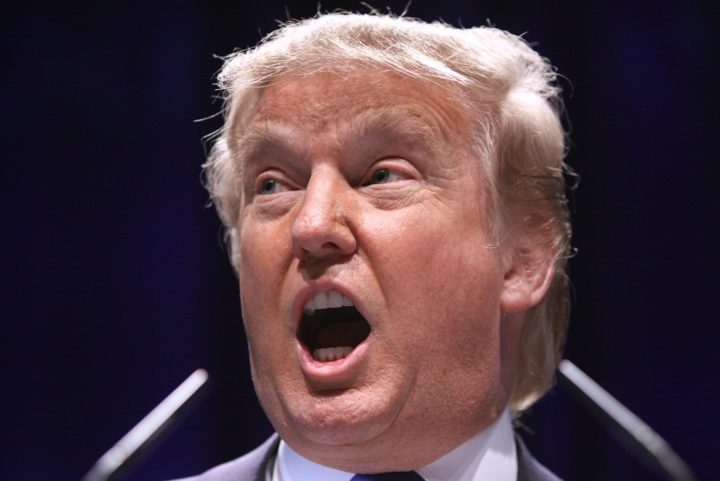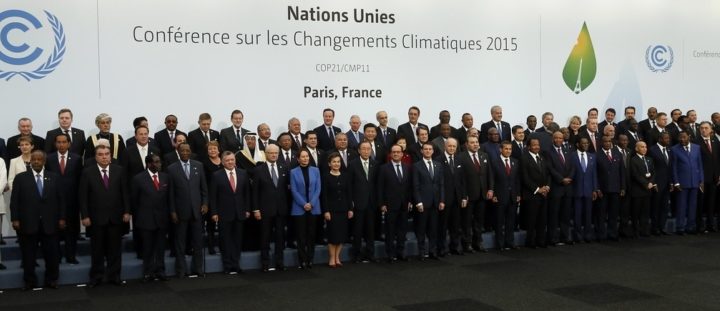Trump’s Paresxit: In whose name?
As Trump weighs up a decision on Paris, Richard Black ponders the rationale behind the decision
By Jonny Marshall
Share
Last updated:
The vast majority of political decisions contain a nugget of logic at their core; you might not agree with them, but you can see why they’ve been taken.
For example, the economic and social logic behind the Conservatives’ manifesto pledge to change social care payments is clear. So is the political logic behind rolling back that pledge. Again, you may not agree with one or the other, or even both, but you can see the rationale.
And in most cases, you can identify the constituency in whose interest a particular measure has been made.

President Donald Trump’s forthcoming decision to pull out, or at least heavily contest, the Paris climate agreement (more on what form it might take later) is an exception to the rule. Neither logic nor constituency is visible.
(Note - I am presuming some kind of pullout thang - he's been teasing for months, but the runes, this time, are reading pretty strongly. The runes and I could be wrong. But read the rest of this as though we're right.)
Are the American people demanding it? Not at all: opinion surveys show a clear majority in favour of the Paris Agreement, not only nationally but in every state. Nearly twice as many Trump supporters back it as oppose it.
Is business demanding it? Au contraire. The last months have seen a succession of company executives trooping down to the White House to press their case for staying in. Those companies include not only the ones you’d expect – the Googles, the Walmarts, the Coca-Colas of this world – but, more remarkably, the oil companies and even coal companies in whose interests the President is claiming to act.
Is it to satisfy international allies? This is the most emphatic ‘no’ of the lot. As the other six members of the G7 made clear last weekend, as the leaders of China and the EU are demonstrating this week, as nation after nation declared on the occasion of Mr Trump’s election last November, the Paris Agreement is here to stay.
So it’s all rather puzzling.
Strange fruit
Then, one can turn to the arguments being made in favour of pullout – fortunately the lobby group the Competitive Enterprise Institute has neatly formulated them for us.
- The Paris Agreement ‘endangers America’s capacity for self-government’. Well – no more than any other international agreement. By this logic, the US certainly ought to withdraw from the World Trade Organization. The corollary is that inside such agreements, the US has the capacity to steer other nations to its vision – and the US has largely got its way, historically, due to its huge economic muscle
- ‘The United States cannot comply with the Paris Agreement and pursue a pro-growth energy agenda… the Paris Agreement’s central goal is to make fossil fuels… more expensive across the board’. There’s abundant evidence showing that on a macro-scale, economies do not suffer from climate policies – G7 countries have all grown their economies and shrunk their emissions on a per-capita basis over the 25 years from Rio
- It’s also a mis-characterisation of the likely impact of the Paris Agreement, which will be to make all forms of energy cheaper – renewables, storage, electric vehicles etc by creating a massive global market, fossil fuels through reducing demand
- ‘Withdrawing from the Paris Agreement is a humanitarian imperative’ for the poorest people. This is a truly bizarre statement. I can’t think of a single organisation working on the ground to improve the lives of poor people that doesn’t back the Paris Agreement. Christian Aid, Oxfam, Tearfund, Cafod… how long do you want the list to be? And we can add the Pope, and leaders of most major faiths. Oh, and the military, who are often at the heart of interventions after humanitarian crises.
Very strange indeed.

Mother of all decisions
The only argument that holds any water is a legal and constitutional one. This holds that the Paris Agreement is a treaty, and thus should have been subject to ratification by the US Senate. President Obama didn't want to do this because the Senate would have demurred, and his lawyers ensured that the Agreement was written in such a way that in their view, it wouldn’t need Senate ratification.
In the final analysis, arguments like this are usually settled in court. And that’s where this one may end up if the President uses the Senate route to scupper the deal.
On which note; I think he has five exit strategies before him:
- Exit the Paris Agreement by the formal route, which would take four years
- Exit the underlying UN climate convention, which would take one year
- Use the approach modelled by South Park’s Eric Cartman, namely – ‘screw you guys, I’m going home’ – ie, a unilateral pullout with no regard to procedure
- Demand renegotiation of the Paris Agreement
- Argue that the Agreement needs to be ratified by the Senate, and send it there.
Option three is the truly nuclear one, detonating at a stroke any notion of President Trump’s US being a respecter of international norms and processes. Two would be at least a ‘Mother of all Bombs’, while option one will surely be dismissed from contention as a squib.
Which is why I reckon, personally, it’ll be either a renegotiation demand or toss to the Senate – or conceivably a mixture of the two.
Heaven for lawyers
As to what effect a Trump Parexit would have… well, this would take a couple of other blogs to explore properly. Luckily, both already exist: I wrote this on the likely impact on the Paris process shortly after Mr Trump’s election – and University of California’s Professor Dan Kammen has also covered for us the realities of the US energy scene.
But here’s the quick takeaway.
Agreements like that formed in Paris in December 2015 are often mis-characterised as things that drag nations kicking and screaming to the negotiating table where they’re forced to sign a set of demanding pledges. While a little arm-twisting does happen, basically no country – certainly not big ones such as China and India – will sign an agreement that they think runs against their national interest.
And to a large extent, the Paris Agreement reflects what those countries are already doing. Both had massive plans for a clean energy expansion before the Paris summit, and since then have stepped up the pace – notably on constraining use of coal, the most polluting fuel. China in particular is likely to exceed its Paris commitment – and according to one recent analysis, that’ll go some way to making up for slower US decarbonisation.
The happiest profession in the US after Mr Trump’s announcement is likely to be the legal one.
But for the public, for business, for countries wanting a good relationship with the US, the big question remains: in whose interest are you doing this, Mr President?
Share